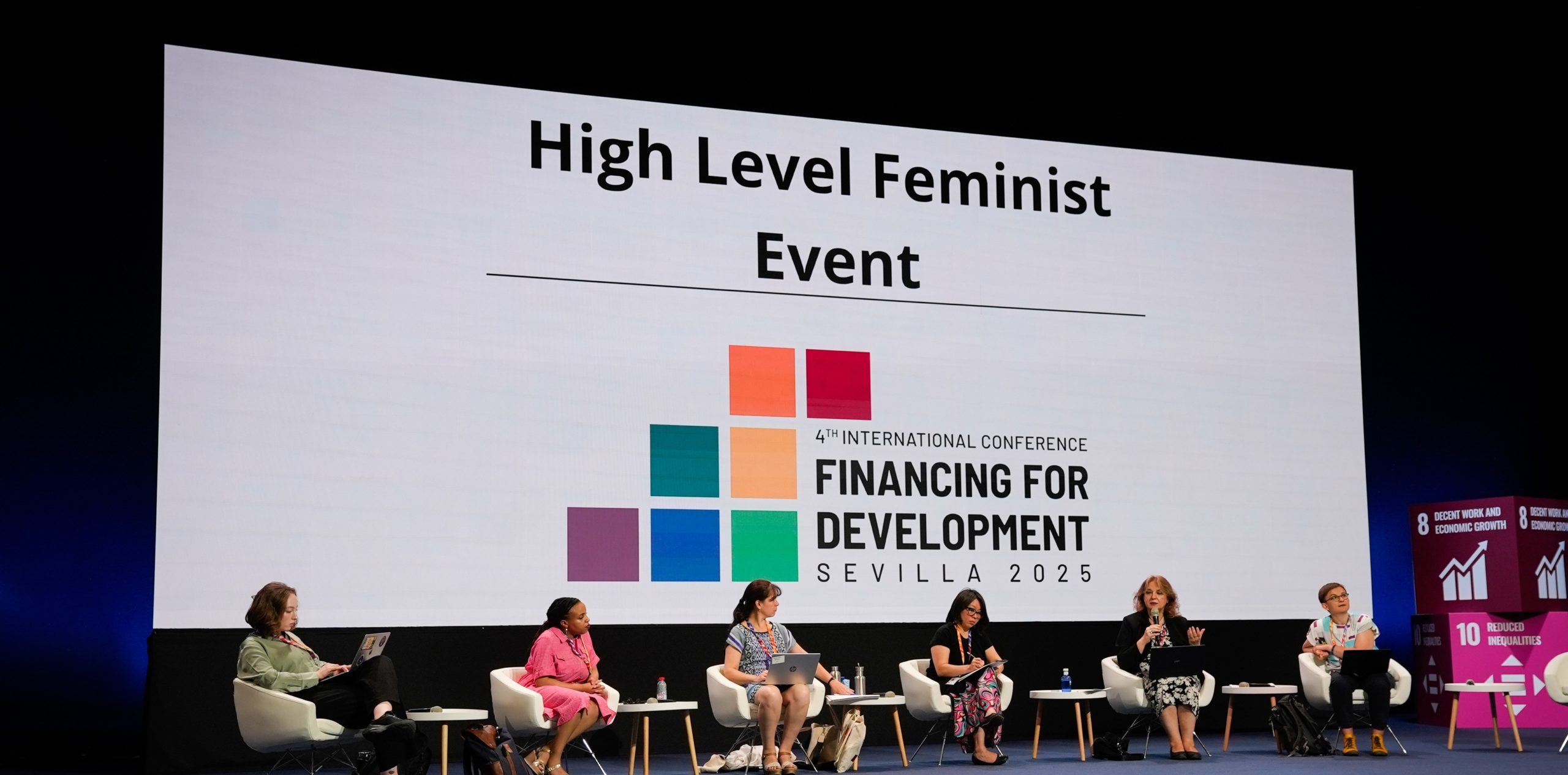Why is Financing for Development (FfD) a feminist issue? And what did the Fourth International Conference on Financing for Development (FfD4) achieve from a feminist perspective?
Regions Refocus spearheaded an all-day CS FfD Mechanism side event at FfD4, entitled “Reclaiming Financing for Gender Justice and Structural Transformation: A High-Level Feminist Event,” to tackle these questions and elevate structural feminist analysis. Held on 1 July 2025, members of civil society, academics, and experts came together for three jam-packed Fireside Chats which covered all of the FfD thematic areas. They highlighted the feminist perspective of each issue, unpacked the sections’ successes and failures, and looked ahead.
The opening session, “Feminist Priorities for Just and Inclusive Development,” kicked off with an introduction from Anita Nayar (Regions Refocus), highlighting the historical wins of the feminist economic justice struggle as well as the current regression and backlash we’re fighting. Mabel Bianco (Women’s Major Group) and Nicole Maloba (FEMNET) spoke next, echoing the need to center feminist demands in FfD4. Lidy Nacpil (APMDD) followed, emphasizing the important role of cross-movement organizing in progressing towards feminist economic justice and connecting the event to the Civil Society Forum. Two keynote speakers– Maria Fernanda Espinosa (former President of the UN General Assembly) and Dr. Caren Grown (founding member of IAFFE)– closed out the opening session. They spoke about their respective experiences championing feminist economic justice, the former in the multilateral and diplomatic arena and the latter in civil society, academia, and inside international financial institutions (IFIs).
Fireside Chat 1, “Feminists Against Debt, Trade, and Financial Injustice,” brought together Diana Mochoge (AFRODAD), Erica Levenson (Regions Refocus), Bhumika Muchhala (Third World Network), Nela Porobić (WILPF), Dr. Mariama Williams (Institute of Law and Economics), and Roberto Bissio (Social Watch). Moderated by Kamal Ramburuth (Institute for Economic Justice), the conversation highlighted the compounding impacts that unjust debt, trade, and financial systems have on women’s lives. Some of these impacts include: trade’s facilitation and financing of imperial wars which have highly gendered consequences; defunding of social protection and public services which women rely on to keep up with debt servicing; increasing burdens of unpaid care work for women as they are forced to ‘pick up the slack’ of defunct public services; and widespread corporate deregulation causing women’s access to decent work to decrease. Speakers noted the failure of the FfD4 Outcome Document to reflect any of these real world impacts, and the limited wins we can claim from the process. As Erica Levenson put it, “Business as usual does not mean things staying the same– it means women’s lives continuing to get worse.”
Fireside Chat 2, “Beyond Hegemonic Domestic Resource Mobilization and Private Finance: Envisioning a Feminist Future,” featured Everlyn Muendo (Tax Justice Network Africa), Maria José Romero (EURODAD), Dr. Daniela Gabor (International Commission of Experts on FfD and SOAS), Isabel Ortiz (Global Social Justice), and Celine Tan (University of Warwick) as speakers. Erica Levenson (Regions Refocus) moderated the panel. Speakers made clear that global tax injustice and blind faith in private finance as a catalyst of development are interconnected problems, and have similar impacts on the rights of women. Tax systems are not gender neutral, and play a crucial role in financing investments in gender equality– tax injustice means that this revenue is lost. The biggest culprits of tax evasion and avoidance, the private sector, are also the worst perpetrators of violations of women’s rights. While the FfD4 Outcome Document affirms the importance of the ongoing UN Tax Convention negotiations, much still needs to be done to redistribute wealth and power, regulate corporate actors, and fund rights-based and gender-responsive fiscal systems.
Fireside Chat 3, “Equitable Ecological and Development Cooperation as Feminist Justice,” included Emilia Reyes (Équidad de Genero), Jennifer del Rosario Malonzo (IBON International), Tarcila Rivera Zea (International Forum of Indigenous Women [FIMI]), Attiya Waris (United Nations Independent Expert on Foreign Debt and Human Rights), and Leo Atakpu (Africa Network for Environment and Economic Justice). Moderated by Flora Sonkin (SID), the discussion showed that equitable ecological and development cooperation are crucial in ensuring climate action, adaptation, and mitigation on the one hand, and upholding women’s economic and social rights on the other. Despite this urgency, the FfD4 Outcome Document failed to deliver meaningful progress on either front, which highlights the gridlock in multilateralism today– and every minute that decisive action is not taken, the urgency only grows. In the meantime, Indigenous peoples, and in particular Indigenous women, continue to bear the brunt of ecological preservation, and the lives of women across the Global South continue to get harder.
In all, the High-Level Event illuminated the connections between thematic areas and provided a space to elevate a structural feminist analysis that was absent elsewhere. It showed that every FfD issue is a feminist issue– and that feminists have myriad reasons to be concerned by the utter failure of the FfD4 Outcome Document. Crucially, the event facilitated cross-regional and cross-movement dialogues, building broad solidarity in the long road ahead in our shared struggle for feminist economic justice.








